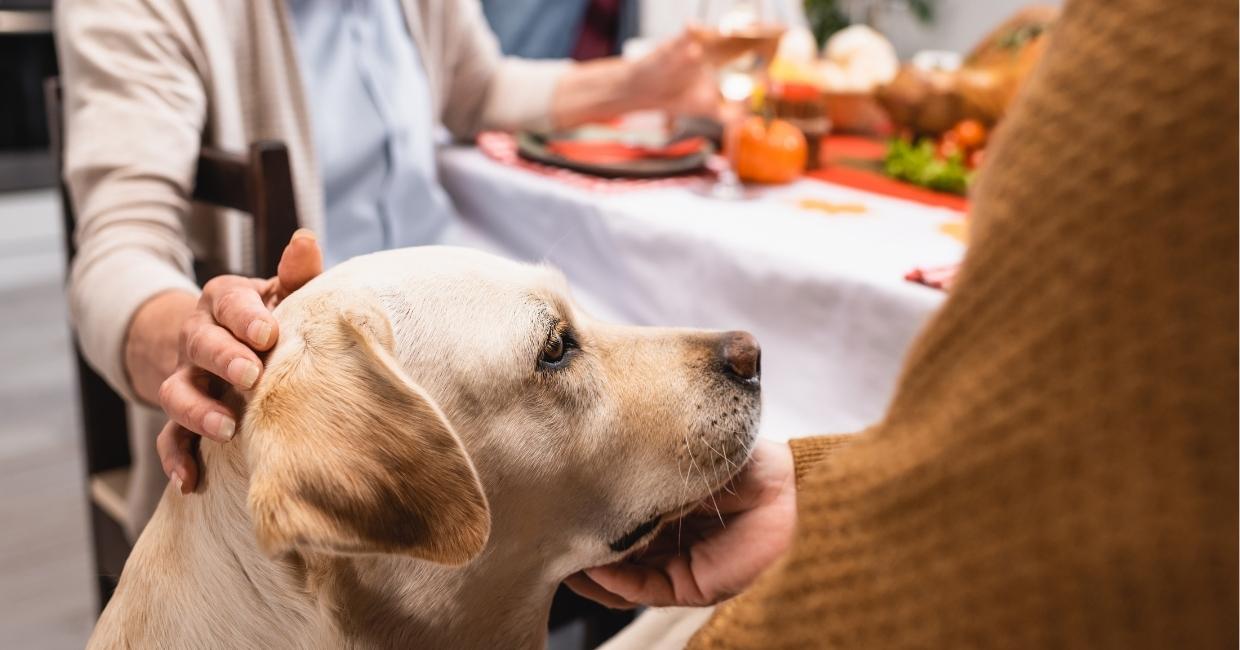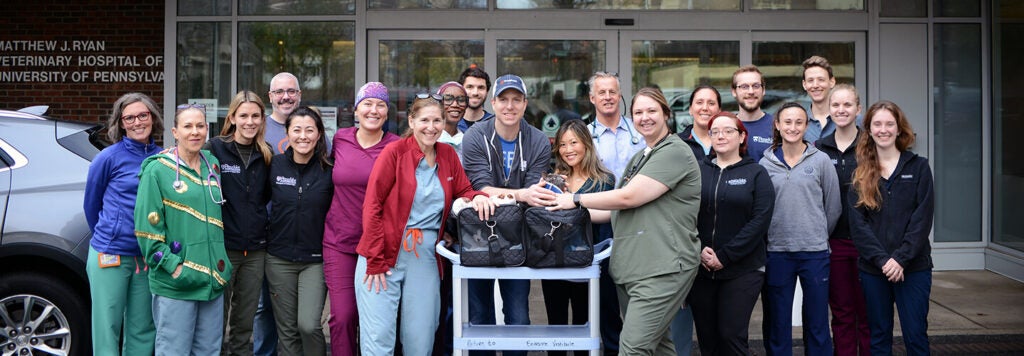6 Must-Know Thanksgiving Pet Safety Tips from Penn Vet

Thanksgiving is all about food, family, friends, and fun — but for your pets, it can be a minefield of dangerous treats and holiday hazards. To make sure your furry friends stay healthy (and avoid a trip to the emergency room), Service Head of Emergency Services at Penn Vet’s Ryan Hospital Deborah Mandell offers expert-approved tips.
Read on to make this holiday season stress-free for you and your pets!
1. Stick to Their Normal Diet
You might get puppy eyes, but resist the temptation to share your Thanksgiving feast with your pet. Rich foods like turkey, ham, gravy, and festive cookies can cause serious stomach upset, including vomiting, diarrhea, or even pancreatitis — a potentially life-threatening condition. Keep your pet’s diet regular and avoid table scraps.
2. Watch Out for Bones
Leftover turkey and ham might seem like a tasty treat, but they’re a danger for pets. Bones left in meat scraps, especially poultry bones, can splinter and cause gastrointestinal distress or get lodged in your pet’s throat and cause choking. Make sure all bones are kept out of reach and disposed of properly.
3. Say No to Chocolate (and Alcohol!)
It’s common knowledge that chocolate is a no-go for pets, but it can be easy to forget how toxic it is. Even small amounts can cause vomiting or diarrhea, and in larger quantities, heart issues, seizures, and hyperactivity. And if you’re enjoying a holiday cocktail? Keep your pet away from it. Alcohol can cause neurological symptoms and even comas.
4. Grapes & Raisins = Big No-No
Think fruit is a safe treat for your pet? Think again! Grapes and raisins are toxic to many pets, even in small amounts. These sweet snacks can lead to kidney failure, so keep them away from your furry friends.
5. Let Guests Know the Rules
Family and friends might not know which foods are off-limits for your pets. Before everyone digs into dinner, make sure they’re all on the same page about what’s safe for your pet and what isn’t. When it comes to your pet’s safety, it’s better to be safe than sorry.
6. Know Where to Go: Penn Vet Ryan Hospital
Even when following all of the tips on this list, accidents can happen. If your pet ingests something harmful, a quick response is crucial. In an emergency, Penn Vet’s Ryan Hospital is your best bet. The Emergency Service is available 24/7, 365 days a year, so don’t hesitate to get help. They’re staffed by a team of board-certified specialists who are ready to handle critical care situations. Ryan Hospital is also the only veterinary hospital in the country recognized as both a Level I Facility and a Verified Veterinary Trauma Center.
With these tips in mind, you can focus on enjoying your Thanksgiving — knowing your pets are healthy and safe. If your pet is in distress, don’t wait. Call 215-746-8911 or head straight to Ryan Hospital at 3900 Spruce Street in Philadelphia.cal cattle farmer,” she says. “We found tick larvae in the vegetation around El Progreso, a rural community at the entrance to the highlands. We also found a tick in the ear of a stray dog in that same neighborhood. The cattle farmer showed us some of his cows and they were sadly covered in hundreds of ticks.”
Related News

Monkey’s Cross-country Journey Ends with a New Kidney… and Friend
Monkey is a people cat, the kind of kitty who eagerly greets his owners when they come home. He has been a little lovebug since Erik Palitsch and Angi Whitford…
About Penn Vet
Ranked among the top ten veterinary schools worldwide, the University of Pennsylvania School of Veterinary Medicine (Penn Vet) is a global leader in veterinary education, research, and clinical care. Founded in 1884, Penn Vet is the first veterinary school developed in association with a medical school. The school is a proud member of the One Health initiative, linking human, animal, and environmental health.
Penn Vet serves a diverse population of animals at its two campuses, which include extensive diagnostic and research laboratories. Ryan Hospital in Philadelphia provides care for dogs, cats, and other domestic/companion animals, handling more than 34,600 patient visits a year. New Bolton Center, Penn Vet’s large-animal hospital on nearly 700 acres in rural Kennett Square, PA, cares for horses and livestock/farm animals. The hospital handles more than 6,200 patient visits a year, while our Field Services have gone out on more than 5,500 farm service calls, treating some 18,700 patients at local farms. In addition, New Bolton Center’s campus includes a swine center, working dairy, and poultry unit that provide valuable research for the agriculture industry.



